Windows Phone Central App Roundup: Hurricane Season
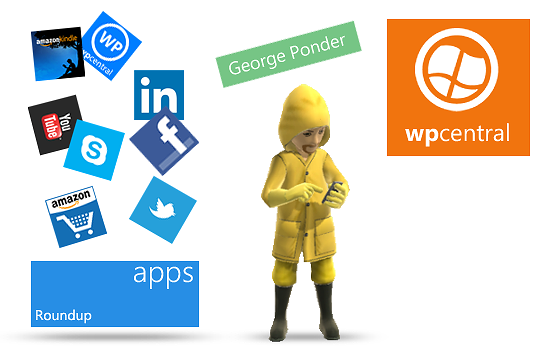
Windows Phone Central's Roundup of Hurricane Apps
We've touched on Windows Phone apps to help everyone stay up on Hurricanes at the start of Hurricane Season back in May. With Tropical Storm Isaac brewing in the Caribbean we thought it would be a good time to revisit the Hurricane app roundup.
These Windows Phone apps keep you informed of the tropical systems as they develop into hurricanes, monitor the storms track, help you weather out the storm, and monitor any systems that may follow Isaac. So far this season tropical activity has been light and hopefully it will continue to be quiet once Isaac passes.
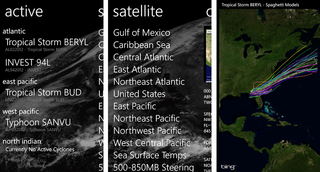
Hurricane Tracker ($.99): Hurricane Tracker provides a comprehensive look at tropical activities. The app covers tropical disturbances in the Atlantic, Pacific and Indian basins and you can filter out those areas that may not effect or interest you.
Hurricane Tracker provides information on specific storm systems, the National Weather Service's storm outlook, the NWS discussion on active storms, and animated satellite views for regions as well as storms. If you're a fan of all the computer models projecting a storms track, you can view all the spaghetti plots. Hurricane Tracker will send out push notifications about newly formed storms.
There isn't a free trial version available for Hurricane Tracker with the full version running $.99. You can find Hurricane Tracker here at the Windows Phone Marketplace.
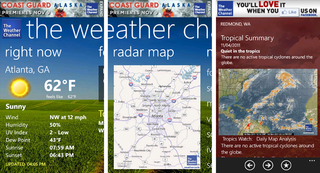
Weather (free): While there are tons of quality weather apps on the Marketplace (here's our Best of list for weather apps) to help you keep track of the weather in your neck of the woods, the Weather Channel's Windows Phone app, Weather, stands out a little as far as hurricanes are concerned. Weather has an section dedicated to Severe Weather Center which includes a Tropical Summary.
Get the Windows Central Newsletter
All the latest news, reviews, and guides for Windows and Xbox diehards.
The Tropical Summary offers the latest information on all the tropical systems on the radar. Add the weather alerts the app provides, Weather does a nice job of keeping you up to date on things.
Weather is a free app for your Windows Phone and you can grab it here at the Windows Phone Marketplace.
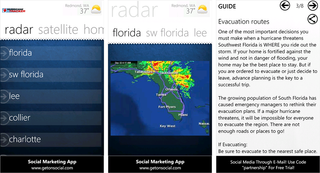
Hurricane Tracking Center (free): Hurricane Tracking Center offers a decent amount of hurricane information but is limited to tracking Atlantic and Caribbean systems. While the app provides radar and satellite images of storms, it also offers a series of guides on hurricane preparedness, evacuation routs, and seasonal outlooks.
You also have access to satellite imagery, hurricane tracking and a weather blog provided by NBC2 out of Fort Myers, Florida. While I found navigation to be a little cumbersome, Hurricane Tracking Center isn't a bad addition to your Windows Phone app library.
Hurricane Tracking Center is a free app that you can grab here at the Windows Phone Marketplace.
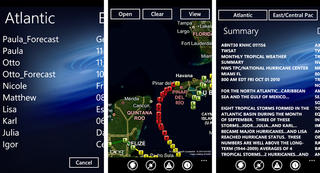
Hurricane Software(trial version/$2.99): Hurricane Software is another comprehensive hurricane tracking app for your Windows Phone. As storms develop, Hurricane Software will provide you with NWS discussion, tracking information and predicted path data. There is also satellite and IR maps available and historical data is maintained on the current seasons' storms.
Hurricane Software also utilizes your Windows Phone location services to tell you how far an active storms is from your current location. Along with storm data, the app issue alerts to your email when a new storm has formed.
There is a free trial version for Hurricane Software with the full version running $2.99. You can find Hurricane Software here at the Windows Phone Marketplace.
Along with these apps, here are some brief pointers on how your Windows Phone can help you weather the storm.
- Flashlight Apps: There are a bazillion of them on the Marketplace and while they come across more as a novelty, if you lose power they may help you get around in the dark.
- Car Chargers: As a hurricane (or any other severe weather system) approaches, keep your Windows Phone on the charger. That way if you lose power you start out with a full charge. If power is out for an extended period, user your Windows Phone conservatively (no marathon games of Wordament) and if it needs re-charging, use your automobile. Just remember to run your car so that battery doesn't deplete.
- Text Messaging vs. Voice Calls: In the aftermath of a hurricane areas may experience power loss and downed utilities. What utilities (e.g. phones) are working will become overloaded and you may not be able to call out due to busy networks. Try texting to get a short message out to friends and family to let them know you are alright. Text data uses a short burst of data that will have a better chance getting through busy networks.
- Insurance Claims: Should your house, apartment, car or other vehicle (boat, motorcycle, etc) receive damage from the storms, use your Windows Phone camera to document the damage. I would recommend taking photos of the overall damage and slowly work your way closer to specific areas of the damage. This will give you a record of the damage so you can begin removing the debris and start the clean up efforts. GEICO, USAA and Esurance all have Windows Phone apps that should help you document any damages as well.
We mentioned this back in May but it's worth repeating. The National Hurricane Center has put together a nice list of items they recommend for a disaster preparedness kit. These items will help you beyond what your Windows Phone can do and the list is worth checking out.
As far as Isaac is concerned, I hope wherever he ends up going everyone fairs the storm well. Based on the National Hurricane Prediction Center, it looks as if there are a few more disturbances in the Atlantic that may develop into tropical systems. Let us hope that the remainder of Hurricane Season (which ends on November 30th) is a quiet one.
If you have a favorite weather app to help you track storms or have any tips on trying to reason with Hurricane Season, feel free to share your thoughts in the comments.
George is the Reviews Editor at Windows Central, concentrating on Windows 10 PC and Mobile apps. He's been a supporter of the platform since the days of Windows CE and uses his current Windows 10 Mobile phone daily to keep up with life and enjoy a game during down time.
